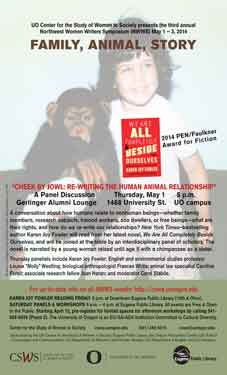 Gerlinger Lounge
1468 University St.
UO campus
Full Schedule
Free & open to the public
Gerlinger Lounge
1468 University St.
UO campus
Full Schedule
Free & open to the public
The third annual CSWS Northwest Women Writers Symposium will be held Thursday May 1, 2014 through Saturday May 3 and will will open with a a conversation about how humans relate to nonhuman beings—whether family members, research subjects, trained workers, zoo dwellers, or free beings—what are their rights, and how do we re-write our relationships? Our keynote writer will be 2014 PEN/Faulkner Award-winner and New York Times–bestselling author Karen Joy Fowler. Her novel, We Are All Completely Beside Ourselves, is narrated by a young woman who was raised until age five with a chimpanzee as her sister. Her father, a psychology professor at Indiana University, was studying their interactions as a research project. When the chimpanzee was abruptly removed from the family, the family unraveled. Still coming to terms some 20 years later with what happened to her family, and especially her sister the chimpanzee, the narrator guides the reader through a personal tale of modern humanity’s sad and broken relationships with animals — and with one another. Fowler is also the author of The Jane Austen Book Club, a New York Times bestseller, as well as four short story collections and four other novels.
Fowler will read short sections from her novel and will be joined at the table by an interdisciplinary panel of scholars. With CSWS director Carol Stabile serving as moderator, the panelists will offer responses from the standpoint of their academic discipline.
Panelists include:
- Moderator: Carol Stabile, director, UO Center for the Study of Women in Society; professor, School of Journalism and Communication, Department of Women’s and Gender Studies
- Caroline Forell is the Clayton R. Hess Professor of Law at the University of Oregon School of Law. One of the courses she regularly teaches is Animal Law. Among her many publications is: Using "A Jury of Her Peers" to Teach About the Connection Between Domestic Violence and Animal Abuse, 15 Animal Law Review 53 (2008). She is a lover of all sentient beings with a special affection for horses, cats and parrots.. She is a founding member of the Lane County Domestic Violence Council. “She grew up on Australia’s Gold Coast and is currently working on an article and screenplay about how the law treated women such as her great-great-grandmother Ellen Murphy who, at age 12, was transported for 14 years from London to Hobart, Tasmania for stealing four books and a bolt of jeans material.”
- Joan Haran specializes in research on science in fiction. Currently a freelance scholar, from April 2004 until October 2013, Joan Haran was a Research Fellow with the ESRC funded Centre for Economic and Social Aspects of Genomics (Cesagen) at Cardiff University, Wales. While there, she co-authored the research monograph Human Cloning in the Media: From Science Fiction to Science Practice (2008). She is currently completing a sole-authored book entitled Genomic Fictions: Genes, Gender and Genre, and co-editing a bilingual collection of short stories and critical essays on the theme of Gender and Science in Fiction with a Brazilian colleague, Dr. Ildney Cavalcanti. She has recently begun a new research project on critical and everyday utopias, with a geographical focus on California and Oregon, and a thematic focus on feminism, science/fiction, sustainability and social justice.
- Louise Westling, professor emerita, English, and core faculty member in the Environmental Studies Program at UO. Louise “Molly” Westling recently published The Logos of the Living World: Merleau-Ponty, Animals, and Language (Fordham University Press, 2014). A related activity is herding sheep with Australian Kelpies, which she describes as “a good way to learn and develop cross-species communication.”
- Frances White, chair, UO Department of Anthropology; White is a biological anthropologist who specializes in behavioral ecology and whose research focuses on the evolution of non-human primate sociality and social systems. She has active field projects with wild bonobos in the Democratic Republic of the Congo and free-ranging primates in the United States.

